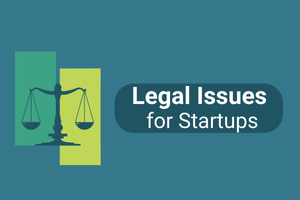This article is the tenth in an ongoing series on Due Diligence. To learn more about performing due diligence quickly and effectively, download this free eBook today Stones Unturned: An Investor's Guide to Due Diligence in Early Stage Companies or purchase our books at Amazon.com.

It might be hard to believe, but it’s not very difficult for an early stage company to run into all sorts of legal issues before they even start to ship product. The good news is that most legal issues at this stage are confined to just a few areas. With just a little research, you can ascertain whether the company has any legal cleanup needed before you are ready to sign the check and close the deal.
For most early stage companies there are four main areas where you want to concentrate your legal due diligence:
-
Third Party Contracts, and
-
Employee Agreements.
Christopher has a long and storied background in corporate law and he’s seen almost every type of legal issue through the years. Entrepreneurs are crazy busy trying to get their company off the ground. Occasionally, they are known to cut corners that they wouldn’t have if they had good legal advice along the way.
Q: Christopher, what are the most important issues to be aware of when you are looking at a company’s Intellectual Property (IP)?
We verify clear ownership or licenses of necessary IP assets. For most early stage investments we make, verifying IP ownership is critical. In particular, we seek to ensure that the company has secured appropriate assignment of invention and non-disclosure agreements with all past and present individuals who worked on the intellectual property, whether as founders, employees, consultants or otherwise. It is also important to confirm that – to the extent the company is utilizing IP from a third party (such as an academic institution) – a company has sufficient rights for a sufficient duration of time (hopefully perpetual) to execute the business plan. You will also want to understand the economics of any licenses as well. And finally, depending on the situation, you may need to do some work to make sure the company has freedom to operate relative to patents belonging to third parties.
Q: We tend to be very early investors in a company. What problems could we run into with the company’s capitalization structure?
We fully document and understand the capitalization structure and history of the company. Understanding each component of the cap structure, including prior financings, the vesting around existing employee equity, and some of the history behind the issuance of stock to non-founders is important both from a historical standpoint as well as from a pro forma perspective. A cap table can provide a strong “fossil record” as to the prior financing history, potential issues with legacy founders, and the current incentive structure for existing employees and founders. Looking behind the cap table can also reveal those parties that may have other claims relative to the company’s stock (such as informal/contractual anti-dilution rights) that can be disruptive to a financing.
Q: Many of the companies we invest in don’t have any outside contracts at the time we invest, but some do. What are some of the pitfalls that startups stumble into with their early third-party contracts?
We are aware of and review any exclusive or restrictive contracts. Early stage companies sometimes do desperate/foolish things to secure a first contract or garner early bootstrap revenue. These contracts can contain provisions that:
-
Grant third-parties exclusive rights with respect to technology,
-
Divest from the company rights around a particular field of use,
-
Limit the territory in which a company can compete, among other things.
Any contracts that limit a company from realizing its business plan or that sacrifice long term potential for short term viability need to be considered when evaluating the overall investment opportunity.
Q: One of the biggest assets that startup companies tend to have are their employees. What issues do we need to research when it comes to employees?
We ask about any ongoing employment issues, and verify key employee agreements and at least barebones policies and procedures are in place. In addition to confirming that the company has adequately protected its IP rights vis-a-vis employees and consultants, we need to understand a company’s obligations to its employees, from promises of deferred salary and bonus to severance agreements to purported grants of equity. Often, in courting prospective employees, a naïve company will make informal promises to individuals that can form the basis for real lawsuits in the future. Wrapping our head around the past and existing employee base will help smoke out potential, costly issues that tend to rear their ugly head when the company closes a financing.
Want to learn more about performing due diligence quickly and effectively? Download this free eBook today Stones Unturned: An Investor's Guide to Due Diligence in Early Stage Companies or purchase our books at Amazon.com.

